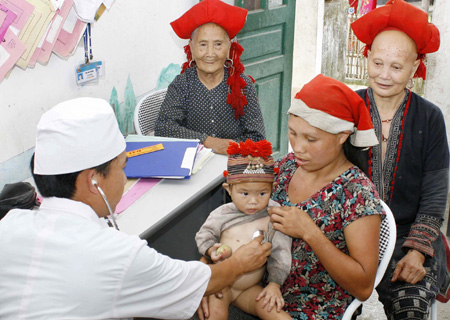
A drastic decline in breastfeeding prompts concerns over the future of child development in Vietnam.
On July 8, Tran Thanh Tuyen, 20, gave birth at Hung Vuong Hospital in Ho Chi Minh City.
The doctors gave her a series of antibiotic injections after a caesarean section. As a result, she only began producing milk four days after delivery. Her infant daughter was fed a popular brand of formula that her grandmother bought from one of the many formula shops that surround the hospital, for the first six days of her life.
“I’m afraid that I’ll pass the antibiotics they administered during the C-section to my daughter through breastfeeding,” she said.
Now she alternates between formula (during the day) and breast milk (at night) due to low milk production.
Tuyen plans to drastically reduce her child’s breast milk intake once she returns to work, in the next few months. The young mother said she didn’t know that researchers have overwhelmingly found that a whole breast milk diet is far better for a child’s development and strength.
No one had ever told her.
International NGOs and health experts have called for further efforts to hem in a sprawling formula trade and to raise awareness about the importance of breastfeeding.
Around 1.5 million babies have been born each year in Vietnam – a country of about 86 million people.
Aiming high
In April, the central government approved a project to improve the height and strength of Vietnamese children.
The project sought to “improve the human resources to serve the country’s industrialization and modernization.”
By 2020, the average height of Vietnamese men at 18 years is expected to be 1.67 meters and 1.685 meters by 2030. The target heights for women are 1.56 meters and 1.575 meters respectively.
But child development experts warn that Vietnam’s mothers have been duped into taking the wrong approach to meeting these goals through ambitious advertising campaigns.
According to a July 12 report from the Ministry of Health, the percentage of Vietnamese mothers breastfeeding is much lower than the global average. In Vietnam, less than 20 percent of babies are exclusively breastfed during the first six months of life while the world's average rate is one out of three.
Over the last decade the exclusive breastfeeding rate in Vietnam has decreased dramatically - from 34 percent in 1998 to 19 percent in 2010. That means only 17 women out of 100 in Vietnam are exclusively breastfeeding their babies for the critical first six months of life.
The figure does not bode well for Vietnam’s ambitious plans to yield future generations that will be taller, stronger and faster.
This year, Vietnam will attempt to implement a set of rather extensive mental acuity and physical agility standards for five-year-old children beginning in the 2010-2011 academic year.
Mind the first step!
Given Vietnam’s ambitious human development goals, experts have argued that there should be greater efforts to promote the importance of breastfeeding.
“Vietnam has experienced significant economic growth in the last decade, yet malnutrition persists. I believe if we work all together, it is within our reach to improve health and expand economic opportunities by addressing malnutrition,” said Nemat Hajeebhoy, Vietnam’s country director of Alive & Thrive, a five-year initiative (2009-2013) funded by the Bill and Melinda Gates Foundation that seeks to reduce malnutrition and death caused by sub-optimal infant and child feeding practices in Bangladesh, Ethiopia, and Vietnam.
Hajeebhoy said that the continued economic development of Vietnam depends on a healthy, educated, and productive workforce.
“The human resource development policy talks about a taller future generation. Economic and employment policies talk about educated and healthy labor forces. Investing in infant and young child nutrition today by strengthening of current policies and programs, we can provide our children and our nation the best foundation for future health and growth,” she told Thanh Nien Weekly via email.
“By adopting policies and programs that enable mothers to make informed choices and receive support to breastfeed, we will realize greater health and opportunity for Vietnam for generations to come,” she said.
David Clark, an international lawyer working for UNICEF who has assisted more than 40 countries in drafting legislation to implement the International Code of marketing of Breast Milk Substitutes, said Vietnam should enforce the implementation and also revise Decree 21 on the trade and use of breast milk substitutes in the country.
“Decree 21 in Vietnam has some strength, but it also has weaknesses. For example, it omits feeding bottles, teats and dummies from its scope, permits manufactures to have contact with mothers outside of health facilities, and allows for advertisements of milk products for children from 12 to 24 months of ages,” Clark said. “The World Health Assembly calls on the protection of breastfeeding up to the age of two years or beyond.”
(Source: Thanhniennews)






